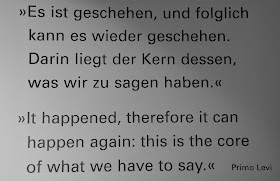I came across Primo Levi's name for the first time in December 2013, at the Memorial for the Murdered Jews of Europe in central Berlin. I described our trip to that shocking place here. On the wall of the foyer of the information centre, which is situated underneath the memorial, there is a large quote from Levi which reads: "It happened, therefore it can happen again. This is the core of what we have to say." Returning home I googled his name, which in turn led me to this book.
There is little that can be said about a book like this, other than to urge people to read it and encounter it for themselves.
Primo Levi was an Aushwitz survivor, an Italian Jewish man, shipped to the camp (or Lager - as it is referred to throughout the book), where his skills as an industrial chemist were exploited in the Nazi slave labour system. In previous books Levi had described the events of the holocaust, documented the atrocities, given his autobiography and biographies of fellow victims. The Drowned and The Saved, is less autobiographical and more analytical than these previous works, as Levi grapples thematically with the experience of industrialised exploitation and extermination.
Levi's reflections - and attempts to understand his experiences - begin with a thoughtful look at memory, and what it can mean to sit now, in relative comfort, but with one's memory contorted with having experienced a death camp. He quotes Jean Amery, Anyone who has been tortured, remains tortured. In "The Grey Zone, Levi reflects on the moral complexities of the reality of life in the camp in that there was not just one type of victim, but a hierarchy of victims whose usefulness to the oppressors extended their lives; but whose collaboration was required. There are awful reflections here on the effects of the systematic dehumanising process on the powerless.
Survivor guilt is a known phenomenon in car crashes, plane crashes and other tragedies. Levi reflects on survivor 'Shame', and the horror of emerging from a death camp amidst the corpses, the crematoria, and the fleeing guards. In 'communicating' he discusses language, and gives weird and sometimes fascinating glimpses into the culture that grew in the camps, and moments of humanity which were never fully extinguished.
Useless Violence discusses the purposeless suffering of the people in Aushwitz. That is, while some of what Primo Levi experienced could be rationalised (in that forced labour could at lease be seen to be in some way benefiting the Nazi regime); so much that he experienced was simply evil for its own sake. As the shackles of morality were thrown away, the SS ceased to go about their work with simply the brute efficiency of slave-masters; but made the infliction of pain, injury, death and humiliation an end in itself. It became an orgy of evil.
It was after reading this chapter that I put the book aside for a month. Frankly it was affecting me too much. My family said it was bothering me, and I was aware that I was waking at night thinking about what I had read, becoming tense and agitated. "I've never known you take so long to finish a book", my wife said.
I have finally managed to pick it up and finish it this week, and follow Levi's examination of "the intellectual in Aushwitz", "Stereotypes" and the final remarkable chapter, "Letters from Germans" in which he describes the reactions (and correspondence) he had with German people of various ages, following the publication of his earlier works in German. It is in the final conclusion that I found the quote from the wall of the memorial to the murdered Jews of Europe in Berlin: "It happened, therefore it can happen again. This is the core of what we have to say." It is worth reading this book and facing the anguish of so doing, simply in order to be part of that not forgetting.
This was Primo Levi's final book. Not long after completing this masterful analysis of what is arguably the central event of the Twentieth Century, Levi took his own life aged 67.


No comments:
Post a Comment